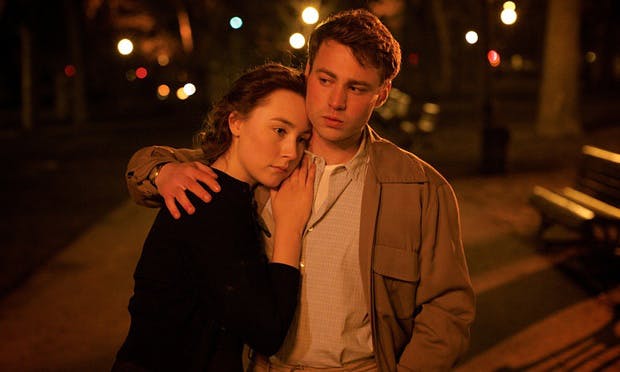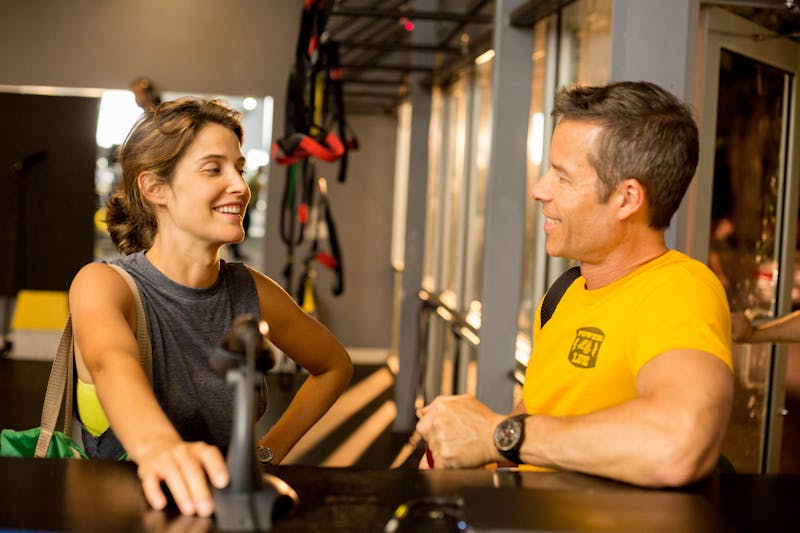
The best movies of 2015 took you to different worlds, whether they were Jakku or Ellis Island in the 1950s, a fundamentalist village or Mars, the darkest dreams of a stranger or a nondescript hotel in downtown Cincinnati. We go to the movies to see a world different than our own. In 2015, the best films took us to places we could have never imagined, places where we ultimately found a version of ourselves.
Here are my top 10 movies of 2015.
10. The Nightmare
Director Rodney Ascher’s follow-up to his well-regarded documentary Room 237 follows a variety of people who suffer from sleep paralysis, a rare condition in which those with the disorder—a group that includes Ascher—are unable to wake up, or even move, from their increasingly terrifying dreams. Ascher’s masterstroke is to take you into the world of those nightmares, not just dramatizing them but forcing you to experience them; they’re as real to you as they are to those afflicted with them. Some have accused Ascher of ignoring the science of these dreams—there are no talking head experts putting sleep paralysis in some sort of context—but that is of course exactly the point. This is a horror that is shared with others but never feels shared with others; it is happening, vividly, to you and only you. There is no reason or rationalization for it. It’s just pure, unadulterated fear. Ascher, perhaps because he has sleep paralysis himself, shows a deep empathy for his film’s subjects that was sometimes lacking in Room 237. Not that the empathy is much help to them. The year’s best scary movie was a documentary.
9. Brooklyn
About halfway through Brooklyn, it occurred to me: I don’t want anything bad to happen to anyone in this movie. The characters in Brooklyn, young immigrants in New York City in the ‘50s, are so big-hearted, so vulnerable and open and winsome and hopeful, that you find yourself trying to protect them from harm. The movie shares that affection, so much so that it avoids forcing them to face any particularly strong conflict until it’s about two-thirds over. That bothered some people—and I’ll confess that “nice people try to be nice to each other” aren’t always the highest dramatic stakes—but I found it a welcome relief. I could have hung out with everyone in Brooklyn for hours: It’s a world you won’t want to leave.

8. Ex-Machina
Smart, nerdy science-fiction, but with a soul: This is a movie that wants to get in your head and, secretly, wants you to do a weird little boogie too. (Oscar Isaac will happily do one for you.) It’s a movie about robotics, and artificial intelligence, but it’s got a subversive, refreshingly human streak to it too; this movie wants to have its Turing test and eat it too. The movie’s conclusion maybe puts too much of a punctuation point on things, but it’s also an ideal way to conclude this satisfying mix of the clinical and the shambolic. No matter how hard you try: There is no ideal lab setting, or control group. It’s all a shitshow in the end. And good lord, what a run Oscar Isaac is on. He should be in every movie.
7. The Tribe
Perhaps more satisfying as a moviegoing experience than a particularly compelling story, this Ukranian thriller features a school for the deaf that highlights humanity at its worst. You name it, there’s pain in this school, from prostitution to drug-dealing to murder to a prolonged, nearly-impossible-to-sit-through abortion scene. That the students, save one, deal with all this with such straightfaced acceptance is the film’s wryly subversive message: No one is even alive enough anymore to feel the pain. This can get a little wearying, but the film’s format—wordless, entirely through unsubtitled sign language—is hypnotic, an entirely new way to watch a film. It makes you deconstruct your movie-watching, looking for different cues: It’s absorbing in a way that’s bracing, like watching a movie without a net. The movie features no music, and no words, yet some moments are so powerful and visceral that I still caught myself covering my ears.
6. Carol
Todd Haynes has always been a meticulous, detail-oriented director—he’s the closest we have to a modern-day American Kubrick—but emotion always bursts through the seams of his movies: It’s as if he challenges himself to contain feeling as long as he can, but never closes it off entirely. This works beautifully in Carol, a love story in which two women (Rooney Mara and Cate Blanchett, in what is probably the most Cate Blanchett has ever Cate Blanchetted) have an instant, overpowering attraction to each other … and spend the rest of the film trying to figure out what to do about it. Carol is honest and straightfaced: It has no illusions about the obstacles facing its lovers, so much so that it considers them less “obstacles” and more fundamental, unmovable forces of the planet. Yet it also gives them room to figure it out, not just their affair, but themselves. This is about two people who didn’t know what their lives were until they met each other, then scrambling, in their muted, buttoned-up way, to figure out what happens next. Haynes loves them so much that he believes they can. You will too.

5. The Martian
An optimistic, cheerful, old-fashioned paean to the power of human ingenuity, The Martian puts a man (Matt Damon, in one of his most winning performances) alone on Mars and then lets him and the entirety of Earth’s scientists try to figure out how to get him off it. For a big Hollywood movie, it feels like a miracle how much it avoids cheap emotional ploys; our hero has no crying family waiting for him to return, or weepy pleas into the camera for rescue. There’s no time for that; there’s work to be done. I don’t care whether the film’s science adds up or anything like that, and you shouldn’t either. All that matters is that it plays fair: It is honest and true to the rules it sets up for itself. There are no shortcuts here. By the end, The Martian earns its cheers. It shows its work.
4. Results
A completely weird, off-kilter, bizarro-land version of a romantic comedy, writer/director Andrew Bujalski finally cracks the Broadcast News code moony filmmakers have been trying to break for three decades. Set, absurdly, in the world of personal training and megagyms, Results introduces us to three lost souls: Trevor (Guy Pearce), a self-help training guru who is a little more confused than he thinks he is; Kat (Cobie Smulders), a motivated trainer straight out of the Holly Hunter mold who’s secretly stronger than everyone else in the movie; and, most memorably, Danny (Kevin Corrigan), an overweight, stoned slob who comes into a ton of money and tries to figure out any possible way it could conceivably help him with his sad life. These three meet and bounce off one another in deeply satisfying ways, each changing the other in fashions they couldn’t have imagined. There has been much discussion of the death of the romantic comedy in recent years, but this is how you do one right. Nobody noticed, but this was your next Broadcast News.

3. Anomalisa
Sad, lonely, and, in its way, oddly hopeful, Charlie Kaufman’s latest is his slightest, least ambitious and maybe most quietly powerful. Told through stop-animation that makes the film seem more fantastical yet also more relentlessly normal, it’s the story of a motivational speaker (voiced by David Thewlis) who visits Cincinnati on business and meets Lisa (an immensely appealing Jennifer Jason Leigh), a woman who is different from everyone else he has ever met in a way that perhaps only he can understand. (And perhaps he can understand only briefly.) It’s a story of loss and love, but more than anything else, it’s a universal story of that human need for connection, however fleeting it might be. Kaufman, for all his breathtaking talents, sometimes can feel a little too misanthropic in his worldview, but it’s opened up here: It feels like he’s allowing himself to see the planet in way he wouldn’t before. I don’t know if it makes him any happier. But it at least allots for the possibility. Anomalisa finds the sublime and the tragic and the overwhelming in the everyday. I can’t stop thinking about it.
2. Mad Max: Fury Road
A non-stop shit-kicking thunderstorm of a movie, one that works on just about every conceivable level you could ask of it. It’s maybe the best chase movie ever made—it is literally just one long chase—but it also allots for moments of humanity and heroism and absurdity: It remembers that life is going on outside its frame at all times. This is an old master putting together his one final masterwork, the one he’s been meticulously crafting for more than two decades now. And Furiosa, as played by Charlize Theron, is destined to be a movie heroine for all time: She not only swipes the movie from the man in its title, she ultimately relegates him to the sidelines of his own movie. Not that he minds. Not that anyone else did either. My heart is speeding up just thinking about this movie.
1. Timbuktu.
There’s a global conflict going on, one that accelerates on a regular, unpredictable basis, constantly morphing into different forms that have become nearly impossible to understand. But day to day, it’s just people, face to face, one on one, dealing with each other. That’s the horror of Timbuktu, which shows, on an almost microbiotic level, what happens when a small village is taken over by Jihadists. We get a look at everybody involved. The people who try to stay out of the way, the devout who discover their devoutness is no help to them here, the Jihadists themselves, often confused about what rules they’re supposed to be following, which one’s they’re supposed to be enforcing, and which ones were just made up on the spot to meet the situation. The movie is devastating in its simplicity, in its insistence on tracking every scenario to its logical conclusion. This movie isn’t about politics. It’s about people just trying to make it through. Sometimes comical, sometimes revolting, always unsparing, Timbuktu, more than any other movie this year, took me somewhere I’d never know otherwise, and made me see it, the way those going through it, on the ground, see it every day. It transports you. Once you’re there, it’ll never leave you.
Grierson & Leitch write about the movies regularly for the New Republic. Follow them on Twitter @griersonleitch or visit their site griersonleitch.com. Listen to their film podcast below.
